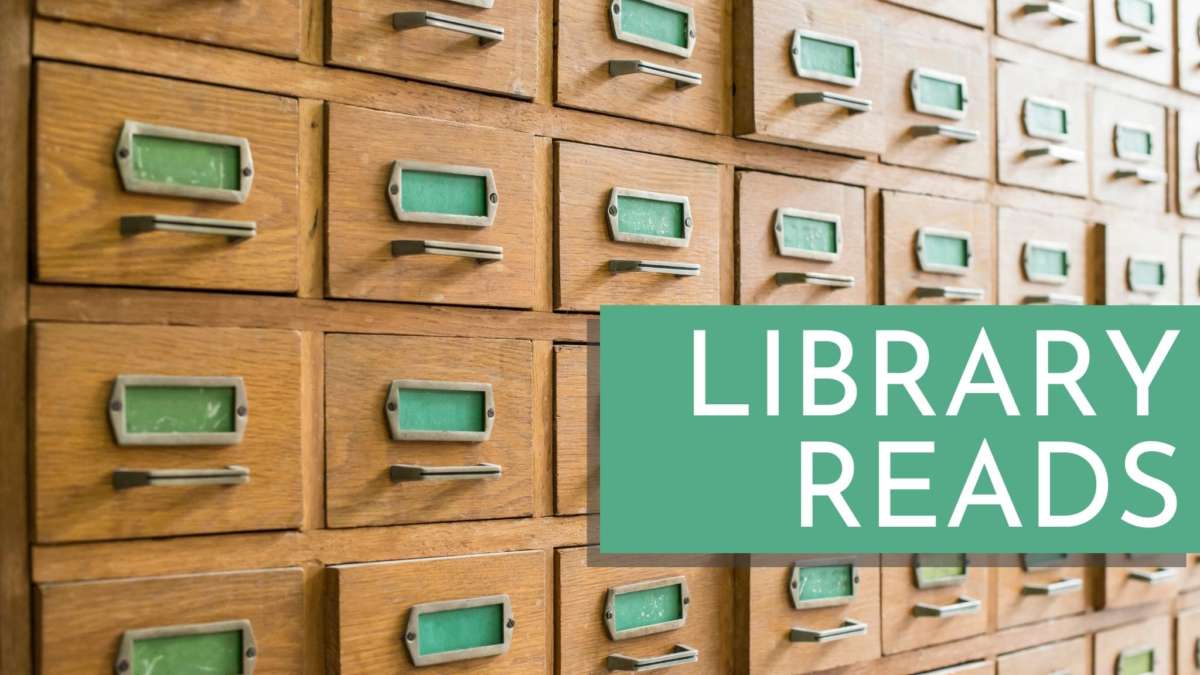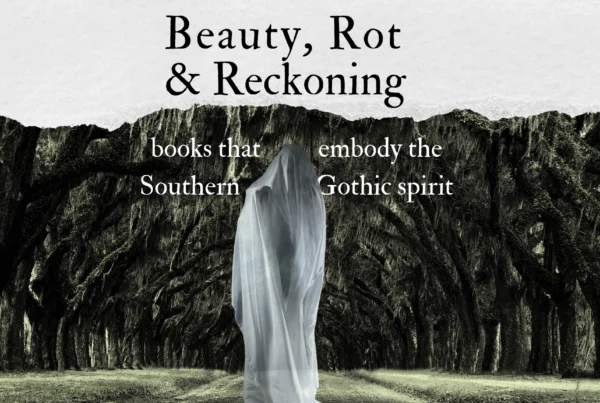Walking into a library is like walking into an opium den. The exhilarating scent of paper and binding — whether musty with age or fruit-sweet and fresh off the press — is a perfume like no other. Endorphins flood the brain. Ahhhhh … books!
Here we can wander among the stacks, letting the spines catch our eye. Pull down a tome and open it up, and there lies a doorway into another world, another mind. Where will it take us? How will it change us? All that potential folded, layered, stacked — book after book, shelf after shelf, row after row. A city of books to explore, to live in for a time. Best of all, they’re all free … as long as we remember to renew or return them by the due date!
This week is National Library Week — a time to celebrate libraries and library workers and also to promote library use and support. So what better way to commemorate this bookish holiday than by pulling together some of our favorite fiction revolving around libraries?
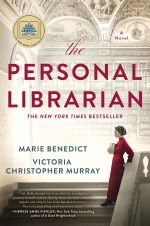 The Personal Librarian by Marie Benedict and Victoria Christopher Murray
The Personal Librarian by Marie Benedict and Victoria Christopher Murray
Where would libraries be without librarians? They’re not just there to shush patrons, after all. A librarian can be your closest ally, putting you in touch with anything you want to know. With one check of your borrowing history, they might learn all your secret obsessions. But what about their own secrets?
This novel recounts the true story of J. P. Morgan’s personal librarian, Belle da Costa Greene. Belle became a fixture in New York City society and one of the most powerful people in the art and book world, known for her impeccable taste and shrewd negotiations in acquiring an incredible number of rare, historically important works that would eventually become a world-class collection at Manhattan’s Pierpont Morgan Library. For a woman at the start of the 20th century, her position was unprecedented, and her story would be fascinating enough if that was all there was to it. Except Belle had a secret. She was a Black woman “passing” as white. And if anyone were to find out, it could reverse all she’d worked for. What’s more, she is the daughter of Richard Greener, the first Black graduate of Harvard and a well-known advocate for equality. This is the story of an extraordinary woman, famous for her intellect, style and wit, and shares the lengths she must go to — for the protection of her family and her legacy — to preserve her carefully crafted white identity in the racist world in which she lives. (Watch BookTrib’s interview with the authors about their unique collaboration in writing this book.)
Tall Poppy Writers Kristy Woodson Harvey and Renée Rosen recommend The Personal Librarian as an “inspiring tale of one of the most brilliant and extraordinary keepers of knowledge of the art and book worlds.”
Amazon | Barnes & Noble | IndieBound | Bookshop
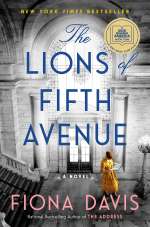 The Lions of Fifth Avenue by Fiona Davis
The Lions of Fifth Avenue by Fiona Davis
Working at a library is one thing. Ever dream of staying in the library overnight? Or better, finding a hiding place among the stacks where you can bunker down and live? Well, Fiona Davis takes that fantasy one step further with a secret seven-room apartment located within the New York Public Library. Except it’s no fiction; there actually was one.
In Davis’s novel, Laura Lyons is the one living the dream. She’s married to the superintendent of the NYPL, a job that comes with that hidden apartment; she even has two beautiful children to share it all with. What more could a respectable woman of 1913 want? But Laura has other ambitions. After getting accepted to the Columbia Journalism School, her entire world opens up, and her studies introduce her to a group of women very different from herself who cause her to question her traditional role as a wife and mother. Laura’s shifting priorities take a backseat, however, when valuable books go missing from the library and jeopardize her family’s position along with the very institution she loves. Eighty years later, in 1993, Laura’s granddaughter Sadie is struggling with her position as curator at the NYPL. An investigation into missing books from a recent exhibit unearths shocking and heartbreaking truths about her own family. (Read the full review here.)
Brilliantly weaving a tapestry from threads of the Gilded Age, women’s rights, New York City, the power of literature and the drama of mystery, the novel vividly places the reader in an era of progress and promise. Hank Phillippi Ryan says, “Davis is such a genius with this — taking a landmark, discovering its true (and fascinating) secrets, and then using them to craft an intriguing page-turner. … Davis has a true gift for seamlessly weaving historical fact into contemporary fiction.”
Amazon | Barnes & Noble | IndieBound | Bookshop
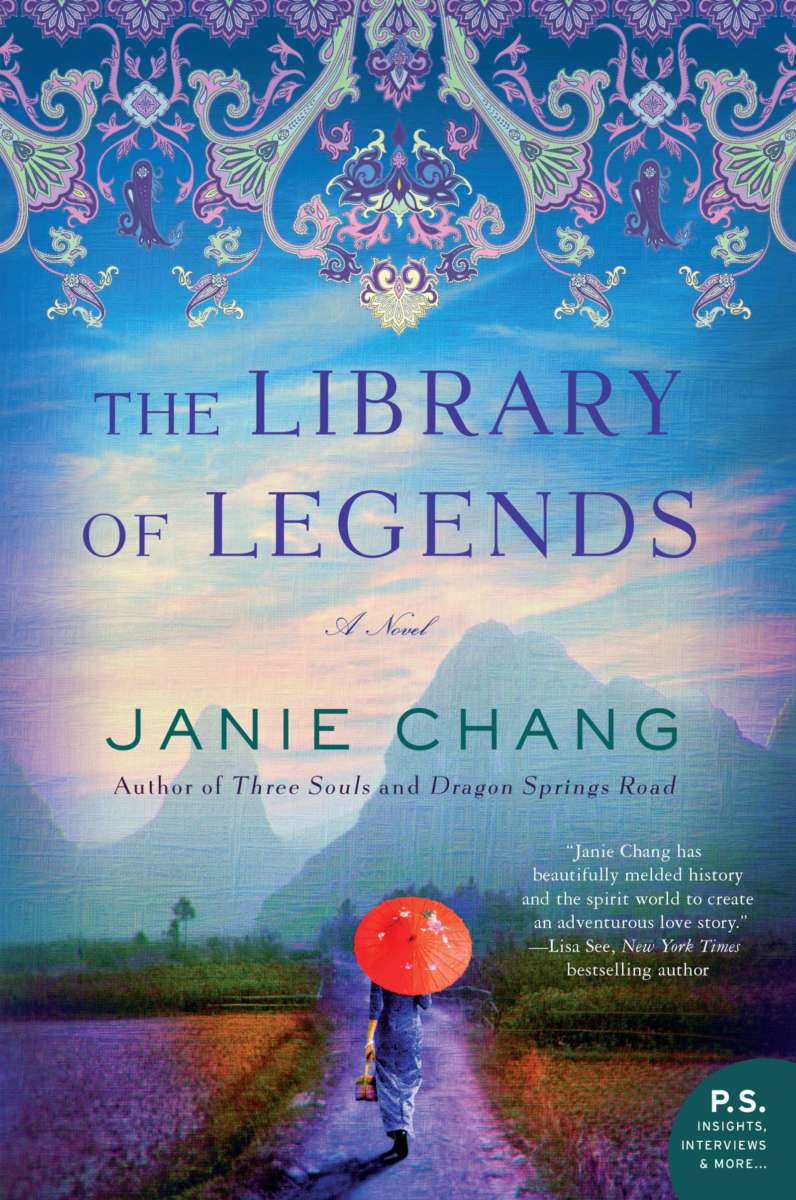 The Library of Legends by Janie Chang
The Library of Legends by Janie Chang
What is a library, if not the books themselves? Such books can be the most precious of treasures, not just for their beauty as objects but for the cultural memory they preserve. In this Tall Poppy Writers‘ favorite, a band of university students risks everything to save some very old, very rare books from the ravages of war.
China, 1937. When Japanese bombs begin dropping on Nanking, 19-year-old Hu Lian and her classmates at Minghua University are ordered to flee to China’s western provinces. It’s over a thousand miles away … by foot. More than 100 students, faculty and staff make the journey, enduring hunger, cold and the constant threats of war along the way. They carry with them a priceless 500-year-old collection of myths and folklore known as the Library of Legends, which has been entrusted to their care. Hu finds herself forging friendships and even a budding romance despite her reluctance to get too attached to anyone, a customary wariness that has roots in her own family’s past. Everything comes under threat, though, when one classmate is murdered, another arrested, and her own secret teeters on the brink of being exposed. But there are also higher and more mysterious forces at work; as the Library of myths travels across China, immortals and guardian spirits awaken to embark on an exodus of their own, and China will never be the same. (Read the full review here.)
Fellow Tall Poppy Julie Cantrell calls this novel “rich in Chinese history and lore … an evocative tale of love, sacrifice and the extraordinary power of storytelling.” Weina Dai Randel offers additional insight; she praises its “enchanting blend of history and fantasy that brings forward a little-known chapter in history about the mass evacuation of Chinese universities during the war.”
Amazon | Barnes & Noble | IndieBound | Bookshop
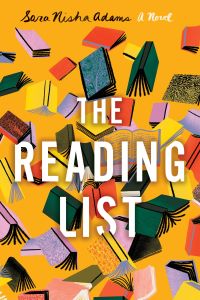 The Reading List by Sara Nisha Adams
The Reading List by Sara Nisha Adams
Perhaps libraries are more about the people they serve than about the books themselves. They act as gathering places for communities to bond over commonly shared books. In this novel, a struggling branch library becomes the nexus between the lives of eight readers.
In a predominantly East Indian neighborhood in suburban West London, a handwritten sign, “Save our Library,” is taped to the automatic doors of Harrow Road Library. Funding cuts have reduced the number of staff placing a greater reliance on volunteers, decreased operating hours, and limited the amount of new inventory. Yet it becomes the convergence point for the random recipients of eight scraps of paper — each containing the same curious yet inviting missive: “Just in case you need it” followed by a list of the same set of novels: To Kill a Mockingbird, Rebecca, The Kite Runner, Life of Pi, Pride and Prejudice, Little Women, Beloved and A Suitable Boy. As one community will soon discover, books hold amazing power — both to heal us and bind us together. (Read the full review.)
Our editor Chelsea Ciccone calls it “a love letter to classics … as well as that safe haven readers call the library. Adams’ debut celebrates community and reminds us just how vital libraries are within it. Above all, it’s the kind of story that makes readers nostalgic for literature while holding a captivating piece of it in their hands — and I don’t have another word for that feat besides magic.”
Amazon | Barnes & Noble | Indiebound | Bookshop
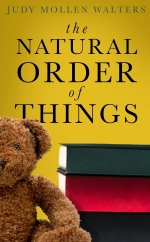 The Natural Order of Things by Judy Mollen Walters
The Natural Order of Things by Judy Mollen Walters
As social hubs, libraries benefit more than just the patrons. Far from a boring and lonely existence, being a librarian allows you to share your passion with everyone around you. This novel is the story of a library worker whose job gets her out and about in her community despite herself, helping her heal old wounds and forge new connections she didn’t think were possible for her anymore.
When 22-year-old Elizabeth Brenner lands in New Jersey with her 15-month-old daughter, Lotty, she doesn’t know a soul. And she prefers it that way. She’s struggling with her own demons — her family in Utah, who essentially threw her out, her ex-boyfriend Evan and father of her baby, and just enough money so that she won’t have to work for a little while. Three-and-a-half years later, Elizabeth is running out of money and needs a job. But what can she do without an education or any real work experience?
When a job opening for a Bookmobile driver at her local library appears, she applies and gets the job. Now, pushed out of her home and comfort zone, she begins to make friends with a colorful cast of characters: Estelle, a 95-year-old woman with a 70-year-old secret; Harper, a 16-year-old high school drop-out who isn’t homeless but might as well be; and Sabrina, a pregnant mother whose secret is so big that she won’t even tell her husband. As Elizabeth juggles all of her new friends’ needs, she meets her neighbor Jeff, and then she finds herself doing something she swore she would never do again.
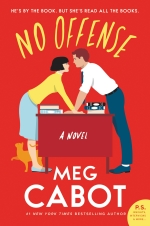 No Offense by Meg Cabot
No Offense by Meg Cabot
So, being a librarian is actually quite a social job. In the world of bookish romances, though, this also increases your chances of finding love — usually of the awkward, adorable sort. This novel, the second in Meg Cabot’s Little Bridge Island series, doesn’t disappoint and serves up a slice of mystery on the side, as well.
When new children’s librarian Molly Montgomery finds a baby abandoned in the bathroom at work, her discovery launches an investigation that upends the town and all its residents. She’s immediately plunged into the complicated and drama-filled world of her new home — and directly into the orbit of Sheriff John Hartwell, whereupon mutual sparks fly. Naming the child Baby Aphrodite, Molly is determined to help John with the case, which ensures they will spend more and more time together. The developments of their investigation bring them closer together, but they also raise questions about their compatibility as a couple. Added to that friction, John’s teenage daughter, a determined reporter, the town’s wealthy matriarch, and the meddling of the other colorful residents of the town start to drive a wedge between the two.
Our reviewer Jane Handa describes it this way: “Exploring the themes of parenthood, community, responsibility, generosity and fairness, No Offense ultimately is a novel that celebrates human relationships and the value of kindness and understanding.” (Read the full review here.)
Amazon | Barnes & Noble | IndieBound | Bookshop
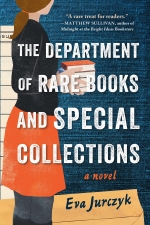 The Department of Rare Books and Special Collections by Eva Jurczyk
The Department of Rare Books and Special Collections by Eva Jurczyk
From abandoned babies, we move on to missing manuscripts in our mini-tour of library mysteries — something that many a rare-book library has likely struggled with at one point or another.
Introverted and self-conscious, librarian Liesl Weis gets thrown for a bit of a loop when the interim directorship of the affluent university library she’s worked at for years falls on her shoulders just as she’s preparing to retire. To add weight to her own doubts about her ability to manage her sudden responsibilities, the library staff are none too happy with the new leadership arrangements. What’s worse, a valuable collection of manuscripts called the Plantin, just purchased for the library and scheduled to be showcased to the wealthy donors who made the purchase possible, has gone missing. The pressure falls on Liesl to get the library through this turmoil without too much damage to its reputation. But it’s hard to know what the right move is when everyone has an opinion on what happened to the Plantin and how she should be handling it. Was the collection merely misplaced, as some are fervently insisting? Or is there a more nefarious explanation behind the loss?
Our reviewer Amanda Gardner writes, “The remarkable aspect of Jurczyk’s novel turns out to be the plot itself. … The solution to the mysteries surrounding Liesl’s library are ingeniously devised, with a resolution improbable that the readers will ever deduce.” (Read the full review here.)
Amazon | Barnes & Noble | IndieBound | Bookshop
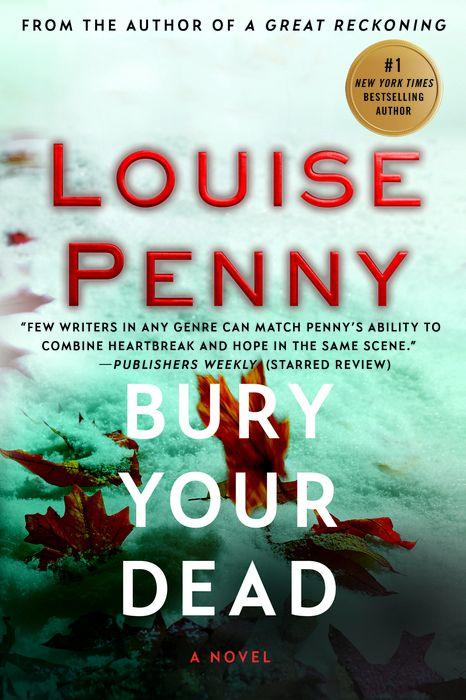 Bury Your Dead by Louise Penny
Bury Your Dead by Louise Penny
Rounding out our library mysteries is this installment of Louise Penny’s Three Pines series. Libraries hold huge quantities of human knowledge and experience, there for the taking by those skilled enough to find it. We all know such knowledge is power, but where there’s power to be had, there are those who will feel threatened by it. In some cases, the results can be deadly.
For this mystery, Chief Inspector Armand Gamache flees to snowy Quebéc City on sabbatical from his police work. Seeking respite there during the annual Winter Carnival, he distracts himself by researching the Battle of the Plains of Abraham, a turning point in Canadian history that resulted in Britain’s rule. While at the Literary and Historical Society library, Armand is (naturally) tapped to investigate when the body of a murdered man turns up in the library’s basement. That man happens to be Augustin Renaud, a scholar obsessed with solving a long-unsolved historical mystery: the burial location of French colonist and founder of Quebéc, Samuel de Champlain.
Had Renaud had been closing in on the truth about Champlain’s burial and were there greater international implications to disclosing the location? Did the British silence Renaud, or was it someone affiliated with the library? Armand must scour Renaud’s diary, research and historical records to uncover the killer. (Read more about what Jodé Millman has to say about this book here.)
Amazon | Barnes & Noble | IndieBound | Bookshop
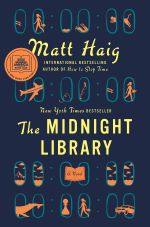 The Midnight Library by Matt Haig
The Midnight Library by Matt Haig
Moving from physical libraries to metaphysical ones, Haig’s enchanting novel imagines a place that houses a collection that’s something like the Akashic Records but exponentially larger and more complex.
Somewhere out beyond the edge of the universe, there is a library that contains an infinite number of books, each one the story of another reality. One tells the story of your life as it is, along with another book for the other life you could have lived if you had made a different choice at any point in your life. While we all wonder how our lives might have been, what if you had the chance to go to the library and see for yourself? Would any of these other lives truly be better? Nora Seed finds herself faced with this decision. Faced with the possibility of changing her life for a new one, following a different career, undoing old breakups, realizing her dreams of becoming a glaciologist, she must search within herself as she travels through the Midnight Library to decide what is truly fulfilling in life, and what makes it worth living in the first place.
“It is quite a revelation to discover that the place you want to escape to is the exact same place you escaped from. That the prison wasn’t the place, but the perspective,” writes Haig. Jennifer Blankfein of Book Nation By Jen calls this book “thought-provoking” and says it “offers wonderful discussion fodder for book groups.” Maybe there’s one meeting in the basement of your local library as we speak.
Amazon | Barnes & Noble | IndieBound | Bookshop
RELATED POSTS
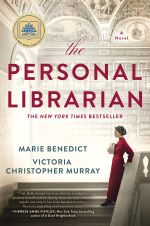
The Personal Librarian by Marie Benedict and Victoria Christopher Murray
Where would libraries be without librarians? They’re not just there to shush patrons, after all. A librarian can be your closest ally, putting you in touch with anything you want to know. With one check of your borrowing history, they might learn all your secret obsessions. But what about their own secrets?
This novel recounts the true story of J. P. Morgan’s personal librarian, Belle da Costa Greene. Belle became a fixture in New York City society and one of the most powerful people in the art and book world, known for her impeccable taste and shrewd negotiations in acquiring an incredible number of rare, historically important works that would eventually become a world-class collection at Manhattan’s Pierpont Morgan Library. For a woman at the start of the 20th century, her position was unprecedented, and her story would be fascinating enough if that was all there was to it. Except Belle had a secret. She was a Black woman “passing” as white. And if anyone were to find out, it could reverse all she’d worked for. What’s more, she is the daughter of Richard Greener, the first Black graduate of Harvard and a well-known advocate for equality. This is the story of an extraordinary woman, famous for her intellect, style and wit, and shares the lengths she must go to — for the protection of her family and her legacy — to preserve her carefully crafted white identity in the racist world in which she lives. (Watch BookTrib’s interview with the authors about their unique collaboration in writing this book.)
Tall Poppy Writers Kristy Woodson Harvey and Renée Rosen recommend The Personal Librarian as an “inspiring tale of one of the most brilliant and extraordinary keepers of knowledge of the art and book worlds.”
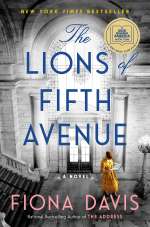
The Lions of Fifth Avenue by Fiona Davis
Working at a library is one thing. Ever dream of staying in the library overnight? Or better, finding a hiding place among the stacks where you can bunker down and live? Well, Fiona Davis takes that fantasy one step further with a secret seven-room apartment located within the New York Public Library. Except it’s no fiction; there actually was one.
In Davis’s novel, Laura Lyons is the one living the dream. She’s married to the superintendent of the NYPL, a job that comes with that hidden apartment; she even has two beautiful children to share it all with. What more could a respectable woman of 1913 want? But Laura has other ambitions. After getting accepted to the Columbia Journalism School, her entire world opens up, and her studies introduce her to a group of women very different from herself who cause her to question her traditional role as a wife and mother. Laura’s shifting priorities take a backseat, however, when valuable books go missing from the library and jeopardize her family’s position along with the very institution she loves. Eighty years later, in 1993, Laura’s granddaughter Sadie is struggling with her position as curator at the NYPL. An investigation into missing books from a recent exhibit unearths shocking and heartbreaking truths about her own family. (Read the full review here.)
Brilliantly weaving a tapestry from threads of the Gilded Age, women’s rights, New York City, the power of literature and the drama of mystery, the novel vividly places the reader in an era of progress and promise. Hank Phillippi Ryan says, “Davis is such a genius with this — taking a landmark, discovering its true (and fascinating) secrets, and then using them to craft an intriguing page-turner. … Davis has a true gift for seamlessly weaving historical fact into contemporary fiction.”
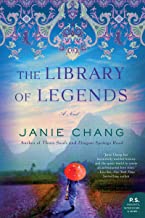
The Library of Legends by Janie Chang
What is a library, if not the books themselves? Such books can be the most precious of treasures, not just for their beauty as objects but for the cultural memory they preserve. In this Tall Poppy Writers‘ favorite, a band of university students risks everything to save some very old, very rare books from the ravages of war.
China, 1937. When Japanese bombs begin dropping on Nanking, 19-year-old Hu Lian and her classmates at Minghua University are ordered to flee to China’s western provinces. It’s over a thousand miles away … by foot. More than 100 students, faculty and staff make the journey, enduring hunger, cold and the constant threats of war along the way. They carry with them a priceless 500-year-old collection of myths and folklore known as the Library of Legends, which has been entrusted to their care. Hu finds herself forging friendships and even a budding romance despite her reluctance to get too attached to anyone, a customary wariness that has roots in her own family’s past. Everything comes under threat, though, when one classmate is murdered, another arrested, and her own secret teeters on the brink of being exposed. But there are also higher and more mysterious forces at work; as the Library of myths travels across China, immortals and guardian spirits awaken to embark on an exodus of their own, and China will never be the same. (Read the full review here.)
Fellow Tall Poppy Julie Cantrell calls this novel “rich in Chinese history and lore … an evocative tale of love, sacrifice and the extraordinary power of storytelling.” Weina Dai Randel offers additional insight; she praises its “enchanting blend of history and fantasy that brings forward a little-known chapter in history about the mass evacuation of Chinese universities during the war.”

The Reading List by Sara Nisha Adams
Perhaps libraries are more about the people they serve than about the books themselves. They act as gathering places for communities to bond over commonly shared books. In this novel, a struggling branch library becomes the nexus between the lives of eight readers.
In a predominantly East Indian neighborhood in suburban West London, a handwritten sign, “Save our Library,” is taped to the automatic doors of Harrow Road Library. Funding cuts have reduced the number of staff placing a greater reliance on volunteers, decreased operating hours, and limited the amount of new inventory. Yet it becomes the convergence point for the random recipients of eight scraps of paper — each containing the same curious yet inviting missive: “Just in case you need it” followed by a list of the same set of novels: To Kill a Mockingbird, Rebecca, The Kite Runner, Life of Pi, Pride and Prejudice, Little Women, Beloved and A Suitable Boy. As one community will soon discover, books hold amazing power — both to heal us and bind us together. (Read the full review.)
Our editor Chelsea Ciccone calls it “a love letter to classics … as well as that safe haven readers call the library. Adams’ debut celebrates community and reminds us just how vital libraries are within it. Above all, it’s the kind of story that makes readers nostalgic for literature while holding a captivating piece of it in their hands — and I don’t have another word for that feat besides magic.”

The Natural Order of Things by Judy Mollen Walters
As social hubs, libraries benefit more than just the patrons. Far from a boring and lonely existence, being a librarian allows you to share your passion with everyone around you. This novel is the story of a library worker whose job gets her out and about in her community despite herself, helping her heal old wounds and forge new connections she didn’t think were possible for her anymore.
When 22-year-old Elizabeth Brenner lands in New Jersey with her 15-month-old daughter, Lotty, she doesn’t know a soul. And she prefers it that way. She’s struggling with her own demons — her family in Utah, who essentially threw her out, her ex-boyfriend Evan and father of her baby, and just enough money so that she won’t have to work for a little while. Three-and-a-half years later, Elizabeth is running out of money and needs a job. But what can she do without an education or any real work experience?
When a job opening for a Bookmobile driver at her local library appears, she applies and gets the job. Now, pushed out of her home and comfort zone, she begins to make friends with a colorful cast of characters: Estelle, a 95-year-old woman with a 70-year-old secret; Harper, a 16-year-old high school drop-out who isn’t homeless but might as well be; and Sabrina, a pregnant mother whose secret is so big that she won’t even tell her husband. As Elizabeth juggles all of her new friends’ needs, she meets her neighbor Jeff, and then she finds herself doing something she swore she would never do again.

No Offense by Meg Cabot
So, being a librarian is actually quite a social job. In the world of bookish romances, though, this also increases your chances of finding love — usually of the awkward, adorable sort. This novel, the second in Meg Cabot’s Little Bridge Island series, doesn’t disappoint and serves up a slice of mystery on the side, as well.
When new children’s librarian Molly Montgomery finds a baby abandoned in the bathroom at work, her discovery launches an investigation that upends the town and all its residents. She’s immediately plunged into the complicated and drama-filled world of her new home — and directly into the orbit of Sheriff John Hartwell, whereupon mutual sparks fly. Naming the child Baby Aphrodite, Molly is determined to help John with the case, which ensures they will spend more and more time together. The developments of their investigation bring them closer together, but they also raise questions about their compatibility as a couple. Added to that friction, John’s teenage daughter, a determined reporter, the town’s wealthy matriarch, and the meddling of the other colorful residents of the town start to drive a wedge between the two.
Our reviewer Jane Handa describes it this way: “Exploring the themes of parenthood, community, responsibility, generosity and fairness, No Offense ultimately is a novel that celebrates human relationships and the value of kindness and understanding.” (Read the full review here.)

The Department of Rare Books and Special Collections by Eva Jurczyk
From abandoned babies, we move on to missing manuscripts in our mini-tour of library mysteries — something that many a rare-book library has likely struggled with at one point or another.
Introverted and self-conscious, librarian Liesl Weis gets thrown for a bit of a loop when the interim directorship of the affluent university library she’s worked at for years falls on her shoulders just as she’s preparing to retire. To add weight to her own doubts about her ability to manage her sudden responsibilities, the library staff are none too happy with the new leadership arrangements. What’s worse, a valuable collection of manuscripts called the Plantin, just purchased for the library and scheduled to be showcased to the wealthy donors who made the purchase possible, has gone missing. The pressure falls on Liesl to get the library through this turmoil without too much damage to its reputation. But it’s hard to know what the right move is when everyone has an opinion on what happened to the Plantin and how she should be handling it. Was the collection merely misplaced, as some are fervently insisting? Or is there a more nefarious explanation behind the loss?
Our reviewer Amanda Gardner writes, “The remarkable aspect of Jurczyk’s novel turns out to be the plot itself. … The solution to the mysteries surrounding Liesl’s library are ingeniously devised, with a resolution improbable that the readers will ever deduce.” (Read the full review here.)

Bury Your Dead by Louise Penny
Rounding out our library mysteries is this installment of Louise Penny’s Three Pines series. Libraries hold huge quantities of human knowledge and experience, there for the taking by those skilled enough to find it. We all know such knowledge is power, but where there’s power to be had, there are those who will feel threatened by it. In some cases, the results can be deadly.
For this mystery, Chief Inspector Armand Gamache flees to snowy Quebéc City on sabbatical from his police work. Seeking respite there during the annual Winter Carnival, he distracts himself by researching the Battle of the Plains of Abraham, a turning point in Canadian history that resulted in Britain’s rule. While at the Literary and Historical Society library, Armand is (naturally) tapped to investigate when the body of a murdered man turns up in the library’s basement. That man happens to be Augustin Renaud, a scholar obsessed with solving a long-unsolved historical mystery: the burial location of French colonist and founder of Quebéc, Samuel de Champlain.
Had Renaud had been closing in on the truth about Champlain’s burial and were there greater international implications to disclosing the location? Did the British silence Renaud, or was it someone affiliated with the library? Armand must scour Renaud’s diary, research and historical records to uncover the killer. (Read more about what Jodé Millman has to say about this book here.)

The Midnight Library by Matt Haig
Moving from physical libraries to metaphysical ones, Haig’s enchanting novel imagines a place that houses a collection that’s something like the Akashic Records but exponentially larger and more complex.
Somewhere out beyond the edge of the universe, there is a library that contains an infinite number of books, each one the story of another reality. One tells the story of your life as it is, along with another book for the other life you could have lived if you had made a different choice at any point in your life. While we all wonder how our lives might have been, what if you had the chance to go to the library and see for yourself? Would any of these other lives truly be better? Nora Seed finds herself faced with this decision. Faced with the possibility of changing her life for a new one, following a different career, undoing old breakups, realizing her dreams of becoming a glaciologist, she must search within herself as she travels through the Midnight Library to decide what is truly fulfilling in life, and what makes it worth living in the first place.
“It is quite a revelation to discover that the place you want to escape to is the exact same place you escaped from. That the prison wasn’t the place, but the perspective,” writes Haig. Jennifer Blankfein of Book Nation By Jen calls this book “thought-provoking” and says it “offers wonderful discussion fodder for book groups.” Maybe there’s one meeting in the basement of your local library as we speak.
